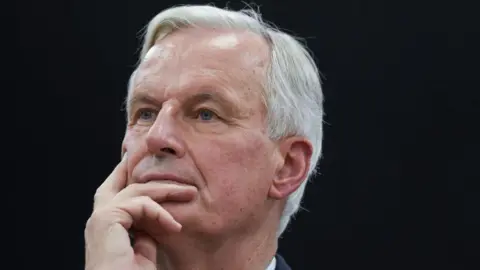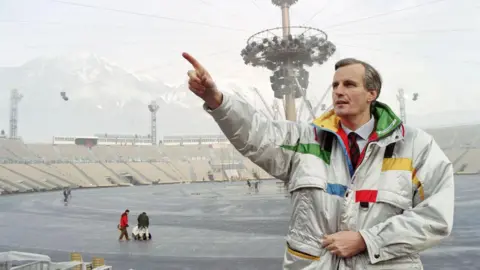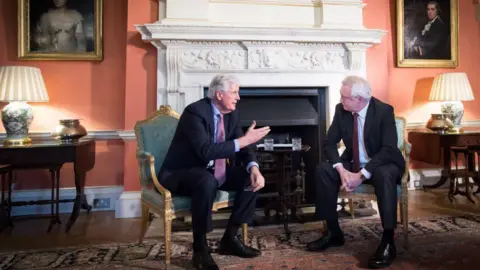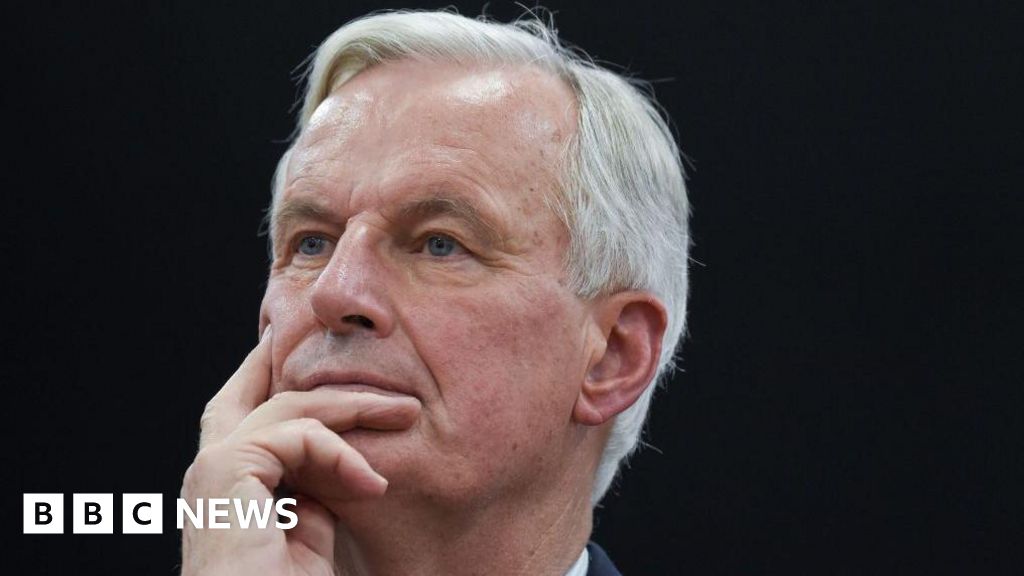 Getty Images
Getty ImagesFrance’s new prime minister has had a long career in politics, but Michel Barnier is best known even in his native France as the EU’s chief negotiator in the Brexit years. His task was to represent the European Union during talks with the UK government.
Born in the mountainous Savoie region in south-east France in 1951, Mr Barnier – a keen skier and hiker – has been a committed, patriotic conservative in the tradition of French leader Charles de Gaulle since he was a teenager.
He joined the right-wing Union for the Defence of the Republic (UDR) party when he was a teenager. To this day, he still belongs to the UDR’s successor, the Republicans (LR).
Mr Barnier did not attend the elite French École Nationale d’Administration, from which many of the country’s leaders hail – but did make history when, aged 27, he became the youngest MP ever elected.
He married Isabelle Altmayer, a lawyer, in 1982. The couple have three grown children and she was in the courtyard of the prime minister’s residence at Hôtel Matignon when he took office.
In 1992 Mr Barnier took great pride in bringing the Winter Olympics to the Savoie – a feat that he said had taught him about working on big projects involving many people, while always keeping an eye on the prize.
He entered politics the following year and served as a cabinet minister in various French governments for several years. In 2010, he became the EU’s internal market commissioner – one of the most coveted jobs in the European Commission.
Still, Mr Barnier aimed higher. In 2014 he mounted an unsuccessful attempt to become president of the European Commission, eventually losing out to Jean-Claude Juncker.
 Getty Images
Getty ImagesIn July 2016, a month after the UK voted to leave the EU, Mr Juncker – who said he wanted an “experienced politician for this difficult job” – picked Mr Barnier to negotiate the Brexit deal.
His nomination was a surprise for some of Mr Barnier’s fellow Frenchmen, who had never held him in particularly high esteem. Only a few years earlier, a journalist from French paper Libération had famously said that Mr Barnier – by then a veteran politician – would always just be a “nice, white-teethed skier, ever so intellectually limited”.
On the EU side, however, Mr Barnier was well known for being diligent and methodical. Crucially, he was also seen as cool-headed – a valuable trait during the first febrile months after the Brexit referendum.
Throughout the gruelling Brexit process he had to work with an ever-changing cast of British negotiators and prime ministers, but Mr Barnier remained largely unflappable, facing what he repeatedly called a “costly and painful divorce”.
Although he was most often pictured sitting around negotiating tables in Brussels or London, much of the work to disentangle the UK from the EU was done by Mr Barnier’s staff. Behind the scenes, his chief task was to travel around Europe and build consensus among the 27 member states to ensure the EU maintained a united front.
In the process, he became a familiar sight on TV screens on both sides of the Channel and beyond – tall, sleek and debonaire, generally flanked by an EU flag and typically inscrutable.
There was little emotion in his voice when, seamlessly switching from English to French, he announced on 24 December 2020 that the EU and the UK had reached a post-Brexit trade deal.
Mr Barnier – ever fond of hiking metaphors – had once likened Brexit to climbing a mountain. Soon after that peak was conquered, he began his ascent to the next one.
In the summer of 2021, he launched a bid to be conservative candidate in the 2022 French presidential election, sparing no criticism of President Emmanuel Macron, who he said had ruled France in an “arrogant” manner.
Away from Brussels, Mr Barnier began to shed his image of a consummate EU technocrat.
He called for staunch anti-immigration policies to be implemented in France and across the EU, and said France should be able to ignore certain rulings of the European Court of Justice and the European Court of Human Rights. Some observers were surprised, and interpreted this as populist move.
Others felt Mr Barnier was merely heeding the lessons of Brexit and keeping an eye on the mood of voters.
 Getty Images
Getty ImagesBut his bid to be the Republicans’ presidential candidate was unsuccessful, and for the past three years Mr Barnier has made little noise, as France’s political landscape has become increasingly polarised.
His name had come up occasionally as a potential candidate for prime minister after the July 2024 snap election that left France deadlocked. But it was not until 60 days after the vote that he was named PM by President Macron.
Although Mr Barnier is still primarily known as Monsieur Brexit, President Macron is likely to have chosen him because they are both from the pro-European establishment and share the same right-wing leanings on the economic front.
His Republican background puts him at odds with left-wing parties, but it does mean that centrist, right-wing and populist forces could help him survive the first hurdle of his premiership – a likely vote of confidence.
David Davis, who worked closely with Mr Barnier for several years as the UK’s Brexit Secretary, told the BBC he was “a really solid Frenchman” who was “well-grounded in the real France”.
In his first address as prime minister, Mr Barnier acknowledged the challenges of the task ahead and vowed to tell the truth “even if it is hard to hear”.
“There is a need for respect, appeasement and unity,” he said, in a nod to the fraught political landscape he now presides over.
“I am embarking on this new phase, this new blank page, with a great deal of humility.”

